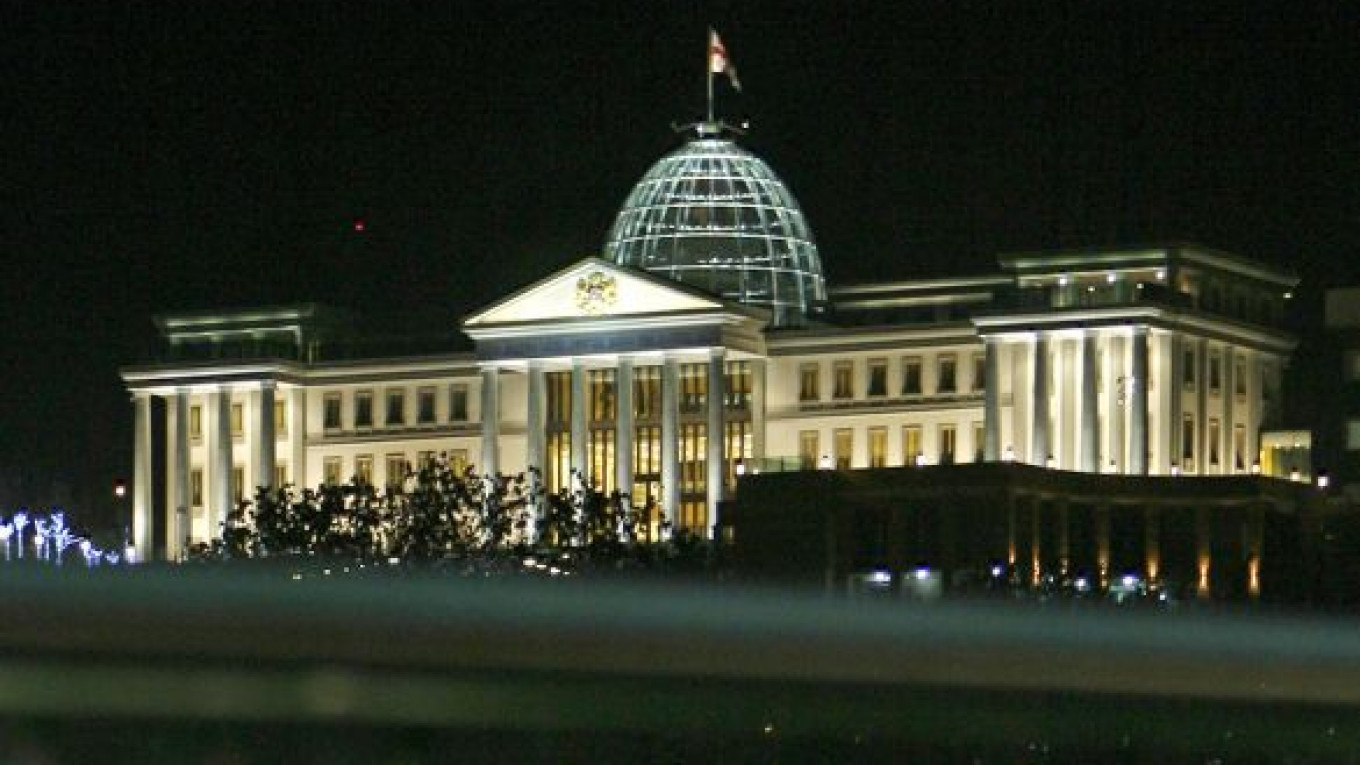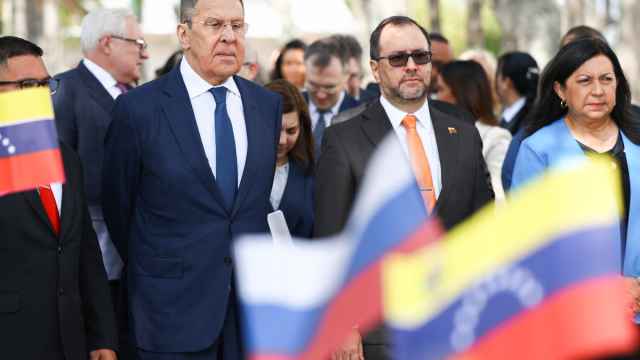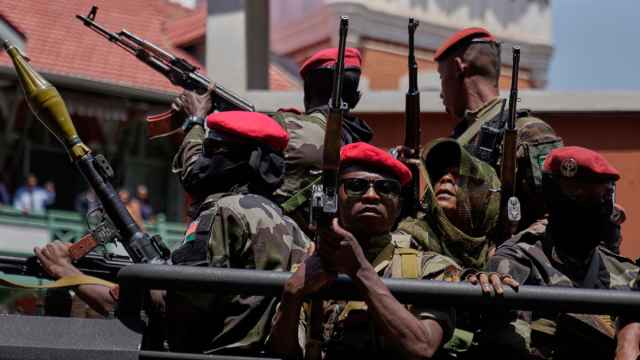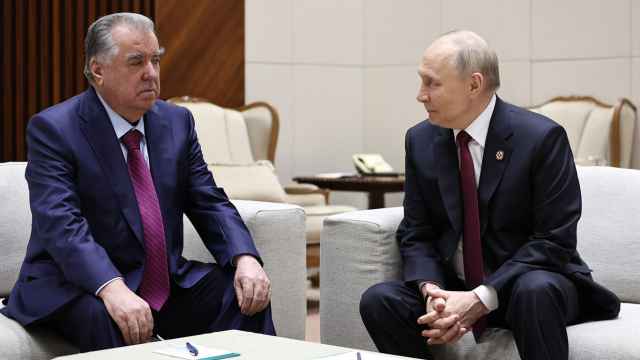TBILISI, Georgia — It is a battle of egos that could not be more visible.
The shining palace of the president and the lavish glass villa of the new billionaire prime minister vie for attention on hills overlooking the capital of Georgia, a U.S.-allied former Soviet republic in the throes of a leadership shake-up.
In a graphic symbol of President Mikheil Saakashvili's fading glory, the outdoor lights that illuminate his official residence will soon go off because his nemesis, Prime Minister Bidzina Ivanishvili, refused to keep paying the bill.
Ivanishvili, who became prime minister after his Georgian Dream coalition unseated Saakashvili's party in this fall's parliamentary elections, has set out to further weaken his rival with a series of arrests of top officials and moves to cut funding to the presidency and curb Saakashvili's powers.
Both men are colorful figures. Saakashvili, 44, is a bear of a man who exudes energy. He was once memorably caught on camera nervously munching on his tie while waiting to do a BBC television interview.
Ivanishvili, 56, is small and lean but no less eccentric. Until entering politics a year ago, he was viewed as a reclusive philanthropist and was known mainly for his collection of exotic animals, including zebras and flamingoes.
Saakashvili dubbed him "the count of Monte Cristo" after the mysterious hero of the 19th-century French novel by Alexandre Dumas.
Ivanishvili, who made his fortune in Russia, has promised to repair ties with Moscow, which were ruptured after the two neighbors fought a brief war in 2008.
But he has dismissed claims that he intends to lead Georgia back into the Russian fold. He also has taken pains to reassure Washington that, as under Saakashvili, the United States would remain Georgia's most important ally.
The two men's power struggle is the result of a constitutional reform that shifts most powers from the presidency to the parliament and prime minister. Saakashvili initiated the reform in 2010 as a way to maintain his influence after serving two presidential terms, the constitutional limit.
But the plan hinged on his United National Movement's winning the October parliamentary election and thus gaining the right to name the next prime minister. Instead, his party was unexpectedly routed by Ivanishvili's coalition, which tapped into public anger over poverty, unemployment and official abuses.
The constitutional changes trimming presidential powers are to take effect only after Saakashvili steps down, but Ivanishvili does not intend to wait that long and will try to enact them earlier.
With his bloc just a few votes short of the two-thirds majority needed in parliament to speed up the changes and Saakashvili's party continuing to lose members, the plan seems realistic.
Technically, the president still has the power to disband parliament and call new elections, but he lacks the public support for such drastic measures.
"He can't do that because it would mean big trouble for him and his party," said Soso Tsintsadze, an independent political expert. "Many people feel strongly negative about Saakashvili and his United National Movement."
Ivanishvili supported Saakashvili early in his presidency and even paid for his inauguration in 2004, but the two men fell out after the 2008 Russian-Georgian war. When Ivanishvili made his political ambitions known, he was stripped of his Georgian citizenship and hit with fines totaling tens of millions of dollars.
Since the election, it is Saakashvili who has been on the defensive, as some of his closest lieutenants have faced legal pressure.
Bacho Akhalaia, the former defense and interior minister, has been in jail since early November over the alleged physical and verbal abuse of six servicemen in 2011.
Georgia's chief military officer, Georgy Kalandadze, who was arrested in the same case, was released but remains under investigation.
Former Deputy Interior Minister Shota Khizanishvili also was arrested on abuse of office charges in another case, along with about a dozen senior police officers.
In the most high-profile case, investigators reopened a criminal inquiry into the 2005 death of Zurab Zhvania, a top Saakashvili ally who was Georgia's prime minister.
Zhvania, who played a key role in the 2003 Rose Revolution that brought Saakashvili to power, was found dead in a friend's apartment in 2005 from what officials said was carbon monoxide poisoning caused by a faulty gas heater.
Zhvania's brother, a lawmaker, has said he thinks that Zurab Zhvania died elsewhere and that his body was brought to the apartment. And he has accused Saakashvili and his top allies of hiding the truth about the death.
Asked recently whether he would move to impeach the president, Ivanishvili said he had no intention of doing so, but he added that prosecutors should continue their work.
"If the prosecutors open a case against top leaders of the country, I will not meddle in it or try to have it closed," he said.
Saakashvili and his loyalists have denounced the investigations as political repression.
The United States and European Union, which had impressed on Saakashvili the importance of holding fair elections and respecting the results, have expressed concerns about the arrests.
Georgia's new foreign minister met with U.S. Secretary of State Hillary Rodham Clinton in Washington late last month and offered reassurances that the arrests were not a political vendetta but an attempt to bring about "the restoration of justice."
Ramaz Sakvarelidze, a Tbilisi-based political analyst, said Ivanishvili has to respond to society's demand that allegations of abuse by leading figures in Saakashvili's administration be investigated.
"Ivanishvili is a hostage of this situation," the analyst said. "If they stop the arrests, the public won't understand."
Public anger against Saakashvili was stoked by videos of prisoners in a Tbilisi jail being beaten and sodomized. The videos were broadcast on television less than two weeks before the Oct. 1 election.
The majority of Georgians seem to relish the new government's moves against top figures in Saakashvili's administration. When the president's party tried to stage a rally in the capital to protest the arrest of the former defense minister, just a handful of people showed up.
Ivanishvili also has kept up pressure on the president by criticizing his lavish lifestyle and sumptuous residences.
From his own gleaming villa on a hill overlooking Tbilisi, Ivanishvili complains that a glass bridge Saakashvili built across the Kura River has spoiled his view.
Ivanishvili once said he'd pay to have the bridge destroyed and another one built, but he backed down when many residents said the money would be better spent elsewhere.
The prime minister's Cabinet immediately cut funds for maintaining the presidential residences, forcing Saakashvili's office to announce that it would switch off the illumination of the presidential palace starting in January.
Ivanishvili also decided to stop providing the $55 million required to maintain presidential aircraft next year and to cut other expenses. Ivanishvili said the money saved will go to support Georgia's hospitals and schools.
A Message from The Moscow Times:
Dear readers,
We are facing unprecedented challenges. Russia's Prosecutor General's Office has designated The Moscow Times as an "undesirable" organization, criminalizing our work and putting our staff at risk of prosecution. This follows our earlier unjust labeling as a "foreign agent."
These actions are direct attempts to silence independent journalism in Russia. The authorities claim our work "discredits the decisions of the Russian leadership." We see things differently: we strive to provide accurate, unbiased reporting on Russia.
We, the journalists of The Moscow Times, refuse to be silenced. But to continue our work, we need your help.
Your support, no matter how small, makes a world of difference. If you can, please support us monthly starting from just $2. It's quick to set up, and every contribution makes a significant impact.
By supporting The Moscow Times, you're defending open, independent journalism in the face of repression. Thank you for standing with us.
Remind me later.






